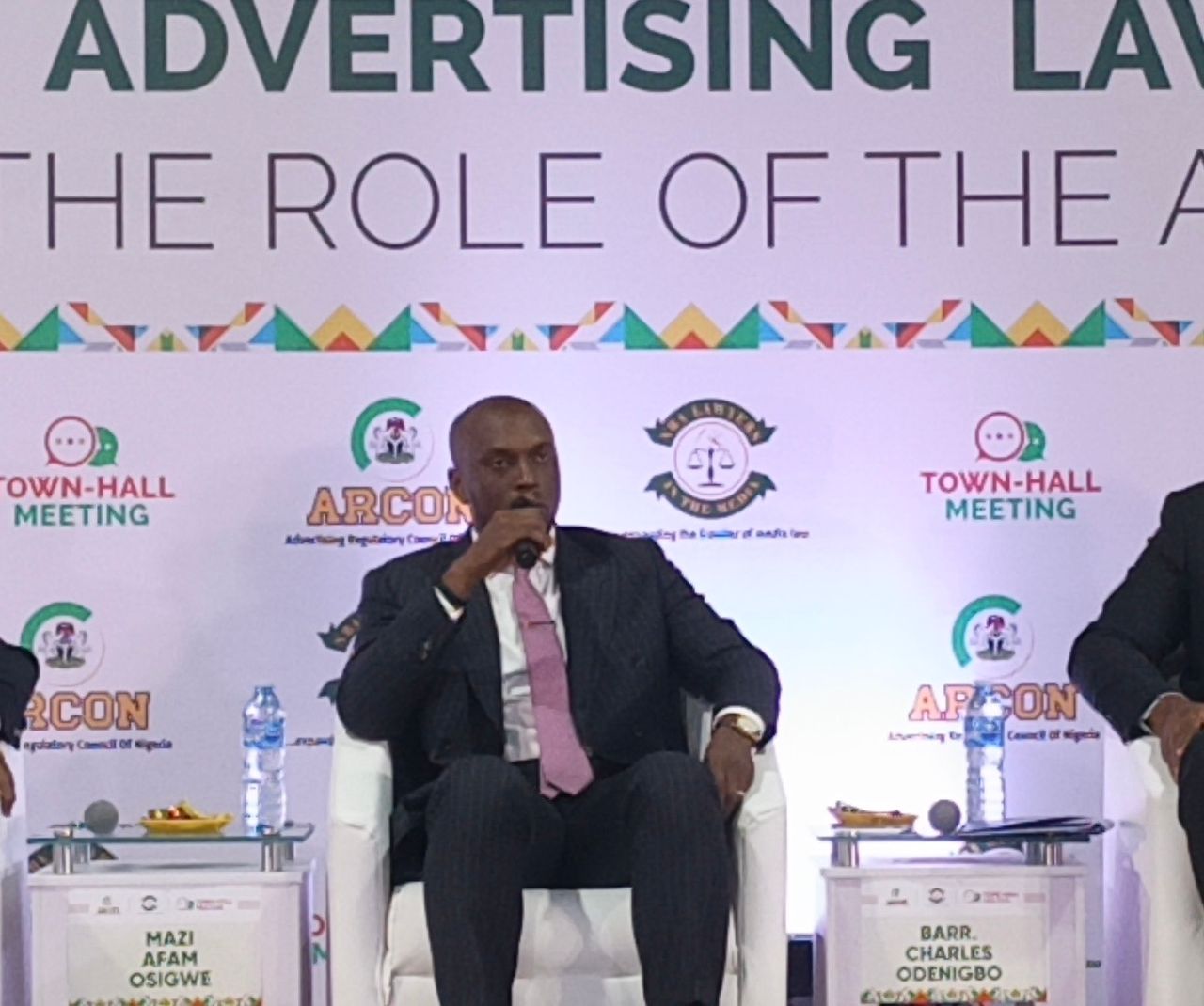Legal and advertising industry stakeholders have affirmed that Nigeria’s advertising sector can achieve sustainable growth without resorting to deceptive practices.
Consequently, this comes into place as regulatory frameworks evolve to protect consumers while fostering creative freedom and innovation.
Engaging Stakeholders in Critical Dialogue
This position dominated discussions at a high-level Town Hall Meeting themed “The Nigerian Advertising Law:
The Role of the Advertising Offences Tribunal (AOT)” organized by the Advertising Regulatory Council of Nigeria (ARCON) in collaboration with the Nigerian Bar Association – Lawyers in the Media Forum (NBA-LIM) at the Sheba Events Center, Lagos.
Bringing the Industry Together
The event brought together members of the bench and bar, advertising practitioners, industry stakeholders, and members of the public to deliberate on the dynamics of Nigeria’s advertising law and its implementation under the world’s first judicial tribunal with criminal jurisdiction over advertising offences.
A Global First in Advertising Regulation
Delivering the keynote address, Chief Akinlolu Kehinde SAN, Principal Counsel, Akinlolu Kehinde & Co., represented by Barrister Leke Kehinde, described the Advertising Offences Tribunal as “A bold experiment in regulatory governance—the world’s first judicial tribunal with criminal jurisdiction over advertising offences.”
He emphasised that the central question before stakeholders is whether “A specialised tribunal can effectively balance consumer protection with creative freedom in Nigeria’s rapidly evolving advertising landscape.”
Highlighting Advertising’s Economic Power
Chief Kehinde provided compelling context for the AOT’s establishment, noting that “Advertising is no longer merely persuasive art—it is the economic bloodstream of our nation.”
He cited PwC data showing that “Nigeria’s advertising industry was valued at over ₦600 billion in 2023, with projections exceeding ₦890 billion by 2028.
This growth reflects advertising’s role as a major driver of jobs, business innovation, and economic activity.”
The Necessity for Specialized Regulation
The senior advocate outlined four critical problems that necessitated the AOT’s creation.
First, the jurisdictional gap under the old APCON regime where “Courts consistently held that APCON could not regulate non-professional advertisers.
This was a fatal flaw in the age of influencers, skit-makers, and social media marketing.”
Second, the enforcement vacuum where “Nigerians were exposed daily to misleading health products, fraudulent investment schemes, and harmful content with no effective recourse.”
Third, the speed problem as “traditional court processes could not keep pace with the velocity of digital advertising.”
Fourth, the expertise deficit as “advertising disputes require technical understanding of creative processes, market dynamics, media platforms, and consumer psychology—knowledge that generalist courts do not always possess.”
A Bold Legislative Step
Chief Kehinde emphasized that “These four problems demanded a bold solution.
That solution came in 2022 with the ARCON Act, which repealed APCON and introduced comprehensive regulation of all advertising, regardless of medium or practitioner status.”
Tribunal’s Structure and Performance
The AOT is chaired by a retired Judge of the Federal High Court or a legal practitioner with at least 15 years post-call experience and cognate expertise in advertising law.
Kehinde explained that “This composition is deliberate.
Advertising cases require more than legal analysis—they demand understanding of creative processes, market dynamics, media platforms, and consumer psychology.”
Early Successes in Enforcement
Since its inauguration in May 2023, the keynote speaker revealed that
“The AOT has handled over 300 cases, marking a new era in advertising enforcement.
These cases span false advertising, unlicensed practice, failure to vet adverts, misleading health claims, and digital platform violations.”
Demonstrating the tribunal’s resolve, Kehinde noted that “In March 2025, it issued a bench warrant for the arrest of the Managing Director of Aero Contractors for repeatedly failing to appear before it in a case involving alleged violations of advertising laws.
This action sent a clear message: the AOT’s jurisdiction is real, and its orders are enforceable.”
Bridging the Digital Gap
Perhaps the most significant aspect of the AOT’s work is regulating digital advertising. Kehinde stated: “For years, social media advertising, influencer marketing, and digital content operated in a legal grey zone.
The AOT has changed that.”
He highlighted that “In a landmark judgment in April 2025, the Federal High Court declared that ARCON has the legal authority to regulate advertising on digital platforms like social media.
This judgment confirmed that the AOT’s jurisdiction extends to every advertisement that targets Nigerian consumers, regardless of platform or format.”
Ensuring Equal Standards Across Platforms
The senior advocate emphasized the transformative nature of this development:
“It means influencers, skit-makers, bloggers, and brands must comply with the same standards as traditional advertisers.
It closes the enforcement gap that allowed digital actors to operate without accountability.”
Constitutional Validity Affirmed
Addressing constitutional questions surrounding the AOT, Kehinde referenced the case of Digi Bay Ltd v Attorney General of the Federation, where “The Federal High Court held that vetting adverts is not an infringement but a legitimate safeguard in the interest of public morality, order, and safety under Section 45 of the Constitution.”
He declared: “The judgment makes plain: free speech is endangered not by regulation, but by its misuse. Advertising, as commercial speech, has never enjoyed absolute protection.
The AOT does not censor ideas—it ensures truthfulness, fairness, and public safety.”
Critical Challenges Identified
The keynote speaker acknowledged five critical challenges facing the tribunal.
First, resistance to jurisdiction where “some parties summoned before the AOT refuse to appear, instead running to the Federal High Court for injunctions restraining the Tribunal.”
He warned that “if every summons or charge can be sidestepped by filing an injunction, the Tribunal risks becoming a paper tiger—bold in theory, weak in practice.”
Confronting Enforcement and Awareness Issues
Second, cross-border enforcement as “Many adverts targeting Nigerians originate abroad.
Foreign brands, ad networks, and platforms reach our citizens at scale but hide behind foreign jurisdictions when accountability comes.”
Third, public awareness deficit where “Most violations stem from ignorance, not defiance.
Many Nigerians—especially small businesses, content creators, and influencers—remain unaware that posting sponsored content without vetting violates the law.”
Fourth, balancing speed with due process as “The AOT’s mandate for swift justice must not compromise fairness.”
Fifth, technological capacity as “digital advertising moves at the speed of light.
The AOT and ARCON must keep pace with technological advancements.”
Nigeria’s Distinctive Approach
Comparing Nigeria’s model to global practices, Kehinde noted that unlike the United States where advertising is regulated primarily after publication through civil enforcement, or the United Kingdom where “the industry regulates itself through the Advertising Standards Authority,” Nigeria has combined “mandatory pre-vetting with criminal jurisdiction through a specialised tribunal.”
Balancing Regulation and Creativity
He explained the implications: “The benefit: we can prevent harm before it occurs and deter violations through criminal sanctions.
The risk: we may be seen as over-regulating, stifling creativity, or delaying time-sensitive campaigns.”
Pathways to Strengthening Effectiveness
The senior advocate outlined five pathways to ensure the AOT’s effectiveness: building strong enforcement partnerships with agencies like CBN, NCC, and NITDA; investing in technology and evidence gathering with digital monitoring tools; prioritizing public education through “aggressive, plain-language education campaigns”; strengthening appellate clarity to reduce forum-shopping; and balancing enforcement with innovation.
Balancing Regulation with Innovation
On the last point, he emphasized: “Rules must protect consumers and uphold standards, yet remain flexible enough to allow creative freedom, new business models, and time-sensitive campaigns.
Over-regulation risks stifling growth; under-regulation risks consumer harm.”
Vision for Advertising’s Future
Concluding his address, Kehinde articulated a compelling vision: “If we get it right if we enforce fairly, educate widely, partner strategically, and innovate constantly—Nigeria will not only be the first country with such a Tribunal but also the first to prove that law and innovation can work hand in hand, that regulation can protect without suffocating, and that advertising can thrive without deception.”
A Call for Collaboration
He called on all stakeholders to “Make advertising a force not of manipulation, but of trust; not of exploitation, but of empowerment.
Let us ensure that the AOT fulfills its promise as an instrument of consumer protection, market integrity, and national progress.”
Commitment to a Balanced Future
The town hall meeting represents ARCON’s continued commitment to stakeholder engagement and building understanding of Nigeria’s evolving advertising regulatory framework, demonstrating that effective regulation and creative freedom can coexist to produce an advertising industry that serves both commercial interests and consumer protection.
ALSO WATCH MARKETING EDGE ONTV






Comment
No comments found.